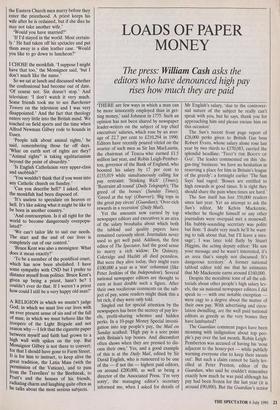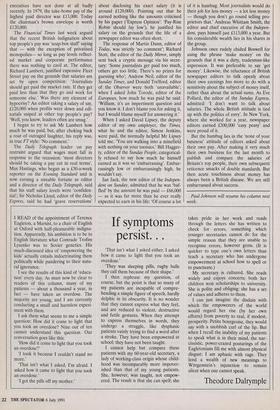LOADS OF PAPER MONEY
editors who have denounced high pay rises how much they are paid
"THERE are few ways in which a man can be more innocently employed than in get- ting money,' said Johnson in 1775. Such an opinion has not been shared by newspaper leader-writers on the subject of top chief executives' salaries, which rose by an aver- age of 22.7 per cent to £210,294 in 1990. Editors have recently poured vitriol on the avarice of such men as Sir Ian MacLaurin, the chairman of Tesco,► who earned £1.5 million last year, and Robin Leigh-Pember- ton, governor of the Bank of England, who boosted his salary by 17 per cent to £155,019 while simultaneously calling for pay restraint: 'Stinking Rich' (Times); `Restraint all round' (Daily Telegraph); 'The greed of the bosses' (Sunday Times); `Greed at the top' (Observer); 'Big tops in the great pay circus' (Guardian); 'Over-rich rewards in a recession' (Daily Mail).
Yet the amounts now earned by top newspaper editors and executives is an area of the salary brouhaha about which both the tabloid and quality papers have remained curiously silent. Journalists never used to get well paid. Addison, the first editor of The Spectator, had the good sense to many a rich widow; De Quincey, Coleridge and Hazlitt all died penniless. But were they alive today, they might earn £100,000 a year as a 'star' columnist (like Peter Jenkins of the Independent). Several national newspaper editors are thought to earn at least double such a figure. After their own vociferous comments on the sub- ject of pay, some readers might think this a bit rich, if they were only told.
Singled out for special attention by the newspapers has been the secrecy of pay lev- els, profit-sharing schemes and hidden perks. In a 10-page Money Special investi- gation into top people's pay, the Mail on Sunday scathed: 'High pay is a sore point with Britain's top bosses. And discomfort often shows when they are pressed to dis- cuss their own.' Yes, and a good example of this is at the Daily Mail, edited by Sir David English, who is rumoured to be one of the — if not the — highest paid editors, on around £200,000, as well as being a director of the Associated Press. I'm very sorry', the managing editor's secretary informed me, when I asked for details of Mr English's salary, 'due to the controver- sial nature of the subject he really can't speak with you, but he says, thank you for approaching him and please excuse him on this occasion'.
The Sun's recent front page report of £28,000 perks given to British Gas boss Robert Evans, whose salary alone rose last year by two thirds to £370,083, carried the splendid headline: 'THAT'S THE BOOTY OF GAS'. The leader commented on this `dis- gas-ting' business: 'we have no hesitation in reserving a place for him in Britain's league of the greedy'; a fortnight earlier 'The Sun Says' had raged: 'Bosses are entitled to high rewards in good times. It is right they should share the pain when times are hard.'
The Sun itself has lost 350,000 readers since last year. Yet an attempt to ask the Sun's editor, Mr Kelvin Mackenzie, whether he thought himself or any other journalists were overpaid met a stonewall. His bubbly-sounding secretary was polite but firm: 'I doubt very much he'll be want- ing to talk about that, but I'll leave a mes- sage'; I was later told flatly by Stuart Higgins, the acting deputy editor: 'He saw your message and he wasn't interested, it's an area that's simply not discussed. It's dangerous territory.' A former national tabloid editor told me that he estimates that Mr Mackenzie earns around £160,000.
Despite the moralistic tone of all the edi- torials about other people's high salary lev- els, the six national newspaper editors I did speak to — with one notable exception were cagy to a degree about the matter of their own pay. With advertising and circu- lation dwindling, are the well paid national editors as greedy as the very bosses they have lambasted?
The Guardian comment pages have been steaming with indignation about top peo- ple's pay over the last month. Robin Leigh- Pemberton was accused of having his 'nose adjacent to the honey-pot — while publicly warning everyone else to keep their snouts out'. But such a claim cannot be fairly lev- elled at Peter Preston, editor of the Guardian, who said he couldn't remember exactly how much he was paid although his pay had been frozen for the last year (it is around £90,000). But the Guardian's senior executives have not done at all badly recently. In 1979, the take-home pay of the highest paid director was £13,000. Today the chairman's brown envelope is worth £120,000.
The Financial Times last week argued that the recent British indignation about top people's pay was 'soap-box stuff saying that — with the exception of privatised monopolies— so long as pay levels reflect- ed market and corporate performance there was nothing to cavil at. The editor, Richard Lambert, justified expensive Fleet Street pay on the grounds that salaries are set by open competition: 'Journalists should get paid the market rate. If they get paid less than that they go and work for someone else.' Was there any element of hypocrisy? An editor taking a salary of say, £120,000 when profits were down and edi- torials sniped at other top people's pay? `Well, you know, leaders often are smug.'
I began to try to ask Mr Lambert how much he was paid, but, after choking back a roar of outraged laughter, his reply was, in true FT style: 'No comment.'
The Daily Telegraph leader on pay restraint argued that wages must fall in response to the recession: 'most directors should be taking a pay cut in real terms'. Max Hastings, who began as a £30-a-week reporter on the Evening Standard and is now earning a sizeable fortune as editor and a director of the Daily Telegraph, said that his staff salary levels were 'confiden- tial% Sir Nicholas Lloyd, editor of the Daily Express, said he had 'grave reservations' about disclosing his exact salary (it is around £120,000). Pointing out that he earned nothing like the amounts criticised by his paper (`Express Opinion': 'Pay-Rise Robin should lay low'), he justified his salary on the grounds that the life of a newspaper editor was often short.
The response of Martin Dunn, editor of Today, was strictly `no comment'; Richard Stott, the editor of the Daily Mirror, simply sent back a cryptic message via his secre- tary: 'Some journalists get paid too much, others get too little. There's no prizes for guessing who'; Andrew Neil, editor of the Sunday Times, and Donald Trelford, editor of the Observer were both 'unavailable% when I asked John Torode, editor of the European, how much he was paid he said: `William, it's an impertinent question and you know it. I don't blame you for asking it, but I would blame myself for answering it.'
When I asked David Lipsey, the deputy editor of my own employer, the Times, what he and the editor, Simon Jenkins, were paid, the normally helpful Mr Lipsey told me, 'You are walking into a minefield with nothing on your tootsies.' Bill Hagger- ty, editor of the Sunday People, categorical- ly refused to say how much he himself earned as it was so 'embarrassing'. Embar- rassingly low or embarrassingly high, he wouldn't say.
Ian Jack, the new editor of the Indepen- dent on Sunday, admitted that he was 'baf- fled' by the amount he was paid — £66,000 — as it was far more than he ever really expected to earn in his life: 'Of course a lot of it is humbug. Most journalists would do their job for less money — a lot less money — though you don't go round telling pro- prietors that.' Andreas Whittam Smith, the editor and chief executive of the Indepen- dent, pays himself just £113,000 a year. But his considerable wealth lies in his shares in the group.
Johnson once rudely chided Boswell for using the phrase 'make money' on the grounds that it was a dirty, tradesman-like expression. It was preferable to say 'get money'. Likewise, the reluctance of British newspaper editors to talk openly about their own earnings has more to do with a sensitivity about the subject of money itself, rather than about the actual sums. As Eve Pollard, the editor of the Sunday Express, admitted: don't want to talk about salaries. The whole British attitude is tied up with the politics of envy'. In New York, where she worked for a year, newspaper editors earned £300,000 'easy peasy' and were proud of it.
But the humbug lies in the 'none of your business' attitude of editors asked about their own pay. After making it very much their own business for the last month to publish and compare the salaries of Britain's top people, their own subsequent reticence smacks of double standards. But then acute touchiness about money has always been a British disease. We are still embarrassed about success.



















































 Previous page
Previous page